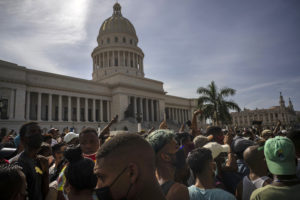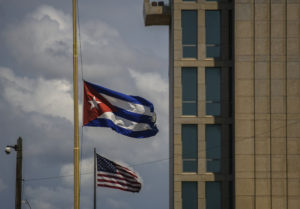News stories and Twitter feeds yesterday trumpeted what sounded like new obstacles that Cuban President Raúl Castro was placing in the path of improved U.S.-Cuban relations. The Associated Press’s headline sounded the alarm: “Cuba’s Raúl Castro to US: If you want normal relations, you give back Guantanamo base.” And an email comment circulated to journalists in response to the news warned ominously that “US will never get rid of the Castros.”
But the understanding of what Castro said, and what it means, has been mostly wrong.
Castro was attending a meeting of the Community of Latin American and Caribbean States (Comunidad de Estados Latinoamericanos y Caribeños, CELAC) in Costa Rica on January 28. As part of a speech on Cuba’s views about hemispheric issues, Castro spoke about the renewal of relations with the United States. He talked about the issues involved in re-establishing diplomatic relations, then went on to list some of Cuba’s priorities in the U.S.-Cuba relationship. In that context, Castro mentioned the return of the Guantánamo Naval Base, the end of the embargo, and Cuba’s claims for damages caused by the embargo as items that need to be resolved in order for a “normalization of bilateral relations, once the diplomatic relations have been re-established.” (Emphasis added.) This is key: Castro never said that the talks on re-establishing diplomatic relations would be abandoned if those issues weren’t resolved. He merely observed that as long as those historical grievances remain outstanding, the United States and Cuba will never have a truly normal relationship.
In spite of the fevered reports about these so-called “demands,” what Castro said is not at odds with the process that he and President Obama outlined in December. On December 17th, the two presidents announced that they were beginning a dialogue to “normalize” U.S-Cuban relations. Both presidents recognized that there were serious differences to be addressed. Both announced that the first step would be negotiations to open embassies in each other’s’ capitals, replacing the “Interest Sections” that currently exist.
In January, Assistant Secretary of State Roberta Jacobson led a U.S. team to Havana to start the discussion on opening embassies. Both sides described the talks as constructive and expect another round to take place sometime in the next few weeks. There are a series of practical issues that have to be addressed, including the number of diplomats at each embassy, the freedom of diplomats in each country to travel without restriction, and the size and number of secure containers included in the U.S. diplomatic pouches sent to our new embassy in Havana. These are difficult but probably not insuperable issues, and most analysts expect that the two sides will work out agreements and open embassies in the next few months.
Once embassies are opened, the United States and Cuba have a long set of issues to discuss. There are areas of mutual interest—drug trafficking, organized crime, oil spills, and environmental issues—where the two sides will find common ground and make progress relatively rapidly. On the other hand, there are a number of areas where the two sides have both profound differences and strong interests, and addressing these will take months and even years. U.S. concerns about respect for internationally recognized human rights in Cuba are on that list; Cuba’s demand that the Guantánamo Naval Base be returned is on the list. U.S. property claims will be important, as will Cuban claims for damages caused by the embargo. No one expects that these discussions will go easily—they involve important and sensitive subjects, and they will take time to work through.
But none of these are unexpected issues. The United States has been raising concerns about human rights in Cuba for 50 years. Likewise, Raúl Castro was not raising the Guantanamo issue as a new concern; Cuba has been asking for Guantánamo back since Fidel Castro came to power in 1959. Both sides have repeatedly made demands about property and damages. When Presidents Obama and Castro made their announcement in December, they did not end the differences between the two countries or inaugurate a love fest. They agreed to begin a discussion that would lead, someday, to normal relations.
The flurry of speculation about the “new Cuban demands” that circulated yesterday both literally misinterpreted what Raúl Castro said in his speech at the CELAC meeting and misread the process of normalization more broadly. Responding to a question yesterday, White House press secretary Josh Earnest pointed out that “There is a pretty clear difference between reestablishing diplomatic relations and carrying out the longer process of normalizing relations.” The White House gets it. It’s too bad the headlines and the tweets didn’t.


